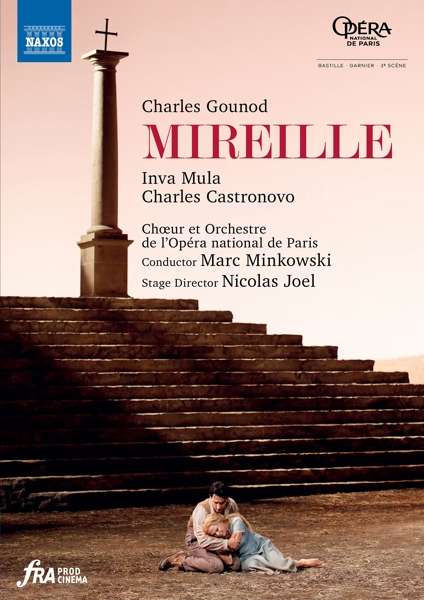Gounods 1864 uraufgeführte Oper Mireille atmet trotz Inklusion einiger übernatürlicher Elemente die Atmosphäre der Provence. Daher kann man es nur begrüßen, dass die Inszenierung der Pariser Oper von 2009 genau diese Atmosphäre unverfälscht und quasi naturalistisch auf die Bühne bringt, nachempfunden dem Roman Mireille von Frédéric Mistral, der die traditionelle Lebensweise der südlichen Region Frankreichs beschreibt. Aufgeführt wird die zweite Fassung in fünf Akten.
Die Handlung erzählt die Geschichte von Mireille, einer jungen Frau aus einer guten provenzalischen Familie, die lieber den armen Bauern Vincent heiraten möchte als Ourrias, einen reichen Mann, den ihr Vater ausgesucht hat. In einer Auseinandersetzung verletzt Ourrias Vincent und lässt ihn schwer verwundet zurück, kommt dann aber selber im Fluss Rhône ums Leben. Mireille erfährt, was Vincent zugestoßen ist und pilgert nach Saintes-Maries, um für Vincents Genesung zu bitten. Bei der Durchquerung der Wüste La Crau erleidet sie einen Hitzschlag, und als sie die Kirche erreicht, stirbt sie in den Armen von Vincent, der sich von seiner Verletzung erholt hat. Von einem Chor von Engeln wird sie in den Himmel gerufen.
Die von keinerlei Regiemätzchen getrübte Aufführung findet ihr Pendant in der musikalischen Darbietung, nicht zuletzt durch Marc Minkowski, der die Musik Gounods ins beste Licht stellt, leicht, unpathetisch, spannungsvoll und dramatisch, mit hellen Farben und einer Dynamik, die den Fluss der Musik von der ersten bis zur letzte Minute aufrecht erhält.
In der Titelrolle ist Inva Mula darstellerisch und stimmlich hervorragend. Sie gestaltet die Rolle einfühlsam, so wie es vor vielen Jahren Mirella Freni gelungen war.
Der junge amerikanische Tenor Charles Castronovo ist ebenso überzeugend als Vincent. Sein Spiel wirkt sehr natürlich, und stimmlich lässt seine Darbietung nichts zu wünschen übrig.
Sylvie Brunet ist die perfekte Interpretin für die Rolle der Taven, und Frank Ferrari singt den Ourrias sehr wirkungsvoll. Alle kleineren Rollen sind vorzüglich besetzt.
Mithin verdient diese Produktion die Höchstbewertung und eine nachdrückliche Empfehlung.
Gounod’s opera Mireille, which was premiered in 1864, breathes the atmosphere of Provence despite the inclusion of some supernatural elements. And so one can only welcome the fact that the 2009 Paris Opera production brings precisely this atmosphere to the stage in an unadulterated quasi-naturalistic manner, this remaining close to the Frédéric Mistral’s novel Mireille, which describes the traditional way of life in the southern region of France. The second version is performed in five acts.
The plot tells the story of Mireille, a young woman from a good Provençal family who would rather marry the poor peasant Vincent than Ourrias, a rich man chosen by her father. In an altercation, Ourrias injures Vincent and leaves him wounded, but then perishes himself in the Rhône River. Mireille learns what has happened to Vincent and makes a pilgrimage to Saintes-Maries to pray for Vincent’s recovery. While crossing the La Crau desert, she suffers a heat stroke and when she reaches the church she dies in the arms of Vincent, who has recovered from his injury. She is called to heaven by a choir of angels.
The performance, safe from any gimmickries which another stage director could have ‘invented’, finds its counterpart in the musical performance, not least by Marc Minkowski who puts Gounod’s music in the best light, light, unpathetic, tense and dramatic, with bright colors and a dynamic that maintains the flow of the music from the first minute to the last.
In the title role, Inva Mula is outstanding in her acting and singing. She sensitively shapes the role, just as Mirella Freni had succeeded many years ago.
The young American tenor Charles Castronovo is equally convincing as Vincent. His playing seems very natural, and vocally his performance leaves nothing to be desired.
Sylvie Brunet is the perfect interpreter for the role of Taven and Frank Ferrari can sing Ourrias very effectively. All the smaller roles are excellently cast.
Consequently, this production deserves the highest rating and an emphatic recommendation.


















